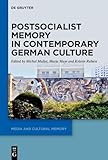Postsocialist Memory in Contemporary German Culture / ed. by Maria Mayr, Kristin Rebien, Michel Mallet.
Material type: TextSeries: Media and Cultural Memory ; 39Publisher: Berlin ; Boston : De Gruyter, [2024]Copyright date: 2024Description: 1 online resource (VIII, 256 p.)Content type:
TextSeries: Media and Cultural Memory ; 39Publisher: Berlin ; Boston : De Gruyter, [2024]Copyright date: 2024Description: 1 online resource (VIII, 256 p.)Content type: - 9783110737738
- 9783110732948
- 9783110730876
- 306.094
- online - DeGruyter
- Issued also in print.
| Item type | Current library | Call number | URL | Status | Notes | Barcode | |
|---|---|---|---|---|---|---|---|
 eBook
eBook
|
Biblioteca "Angelicum" Pont. Univ. S.Tommaso d'Aquino Nuvola online | online - DeGruyter (Browse shelf(Opens below)) | Online access | Not for loan (Accesso limitato) | Accesso per gli utenti autorizzati / Access for authorized users | (dgr)9783110730876 |
Frontmatter -- Acknowledgments -- Contents -- Introduction: Socialism’s Pasts and Futurities -- Foreword: Marica Bodrožić’s Poetic Reason in a Time of Cast-Iron Ideas -- Part I: Memories of Unrealized Futures in the Extended Wende Period -- Ruins of the GDR: Multimedial Aesthetics and Visions of Collapse in Jörg Foth’s Letztes aus der DaDaeR (1990) -- “What Might Have Been”: The GDR as Speculative Utopia at the Post-Wende Volksbühne -- Return from the Future: Ingo Schulze’s Open-Ended Wende Narratives -- Part II: Memories of Unrealized Futures in the New Millennium -- Post-Socialist Historiographies: Visual Art in Eastern Germany 30 Years after the GDR -- From Hollywood to Hoyerswerda: Reclaiming East German (Film) History in Andreas Dresen’s Gundermann -- Postsocialist Melancholy: The Highs and Lows of Terézia Mora’s Darius-Kopp Trilogy -- Part III: The Europeanization of Memories of the Future -- A Continent at Dusk or Dawn? The Multi-Author play Ein europäisches Abendmahl as Transcultural Reflection on European Identity -- Recollecting Fragments, Rethinking the Future: Saša Stanišić’s Assemblages of a Transnational Europe -- Challenging Collective Memory and Identities after Sarajevo: The Imaginative Resource of Individual Memory in Marica Bodrožić’s Work -- About the Authors -- Index
restricted access online access with authorization star
http://purl.org/coar/access_right/c_16ec
Scholarship on Eastern Europe after 1989 often focuses narrowly on the socialist past as authoritarian, dictatorial, or totalitarian. This collection, by contrast, illuminates an additional dimension of post-socialist memory: it traces the survival of hopes and dreams born under socialism and the legacy of the unrealized alternative futures embedded within the socialist past. Looking at contemporary German-language literature, film, theater, and art, the volume analyzes reflections on everyday socialist realities as well as narratives of opposition and dissent. The texts discussed here not only revisit the past, but also challenge the present and help us imagine alternative futures. Rather than framing the unrealized futures envisioned in the pre-1989 era as failures, this collection probes post-socialist memory for its future-oriented potential to rethink issues of community, equity and equality, and late-stage capitalism. Foregrounding the complexities of Eastern European legacies also helps us reimagine the relationship between East and West both in Germany and in Europe as a whole.
Issued also in print.
Mode of access: Internet via World Wide Web.
In English.
Description based on online resource; title from PDF title page (publisher's Web site, viewed 26. Aug 2024)


